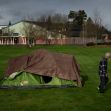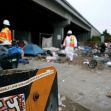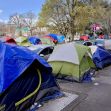The City of Los Angeles is in the midst of a homeless crisis, almost hopelessly entangled in a political, social justice and public health quandary that continues to defy every solution. With approximately 35,000 homeless people living in the city, and 17,000 of them in “makeshift shelters” and encampments, the City passed an ordinance in 2015 that limited the storage of “bulky items” on public property and allowed for them to be destroyed. The Ninth Circuit has ruled that this ordinance is unconstitutional and upheld an injunction against its enforcement.
At issue was one section of the Los Angeles Municipal Code that was enjoined by the district court. It states, “No person shall store any bulky item in a pubic area… Without prior notice, the City may remove and may discard any bulky item, whether attended or unattended,” but exempts bulky items “designed to be used as a shelter,” as well as tents, bicycles, walkers, crutches or wheelchairs. Bulky items were described as those that are too large to fit into a 60-gallon container.
Writing for a three-judge Ninth Circuit panel on September 2, Judge Michelle T. Friedland wrote an opinion that was supported by Judge David A. Ezra. Circuit Judge Mark J. Bennet dissented. The panel agreed with the district court that this “bulky items” provision violates the Fourth Amendment’s protections against unreasonable seizures. It cited precedent that upheld a similar preliminary injunction and said plaintiffs’ arguments in this case were no different. Plaintiffs also argued that their Fourteenth Amendment rights were violated since they were given no notice and thus no due process.
The case began when a group of homeless persons whose personal property had been destroyed, along with two homeless advocacy organizations, sought to enjoin the ordinance. Los Angeles argued that the part of the ordinance that authorized the destruction of “bulky items” could be separated from the rest of the ordinance. They argued that “without the destruction clause the remainder of the bulky items provision would be constitutional.” Removal of bulky property without destruction, they argued, should have led the court to conclude that the rest of the ordinance should be constitutionally permitted.
The panel explained that under California law, the mere presence of a clause that could be separated would not be conclusive. They said that “to be severable, an invalid provision also must be grammatically, functionally, and volitionally separable from the remainder of the act.” This was not the case here. The court cited the absence of any language that provided the city could “move” or “remove” property, thus the taking of property and its destruction were linked and are “inextricably connected” parts of a “multi-step enforcement process.”
Friedland began her opinion with a detailed review of Section 56.11, (the ordinance) which had the legislative purpose of making public areas “accessible and available” to residents for their personal use. It said that “unauthorized use of public areas for the storage of personal property interferes with the rights of other members of the public…” It also says the storage can create “a public health or safety hazard” that this article is designed to prevent. The ordinance makes it a misdemeanor to “willfully resist, delay or obstruct a City employee from removing or discarding a Bulky Item.”
The court's opinion provided details about what could currently be stored under the ordinance. It said that the City may impound and store “unattended property” that “obstructed City operations,” impeded passageways in defiance of the Americans with Disabilities Act,” or were within ten feet of entrances, exits, driveways or loading docks for 90 days. This three-month time limit, the ordinance said, would provide the property owners “the opportunity to reclaim it.”
The opinion then gave details about the controversial “discard” provision that said property could be discarded without first being impounded if it “constitutes an immediate threat to public health or safety or is evidence of a crime or contraband.” It explained that the City’s Bureau of Sanitation and its police department respond to residents’ complaints with clean-ups of “homeless encampments.” During these clean-ups, bulky items such as storage bins, pet shelter crates, and carts can be destroyed.
Judge Friedland described the four factors that courts review when they decide whether to grant preliminary injunctions. These are the likelihood of success on the merits; the likelihood of suffering irreparable if the relief is not granted; whether equities tip in favor of plaintiffs; whether an injunction would be in the public interest. The injunction before the court was then reviewed for abuse of the lower court’s discretion.
She quickly dismissed the City’s Fourth Amendment argument saying that similar arguments had already been “definitively rejected” and concluding that plaintiffs would likely succeed on the merits of their case. The court then provided an eight-page discussion of the controversial “severability” clause that would, if upheld, allow the city to continue impounding, but not destroying, bulky personal property. They concluded that destruction clauses are not severable from the remainder of the Bulky Items Provision.
Finally, the Court made it clear that this opinion did not have to be the end of the matter. Friedland said, “The City is free to draft a lawful version of the Bulky Items Provision, just as it is free to explore alternative methods to respond to the needs of its housed residents while also respecting the rights of its tens of thousands of homeless residents.”
Judge Bennet’s 17-page dissent centered on the severability provision, which he believed should be recognized because the word “may remove” in the ordinance could be separated from the words “may discard.” He reviewed each section of the opinion by his two fellow judges and concluded that the words “may remove” words mandate a separate analysis by the district court to explore the constitutionality of injunctive relief.






